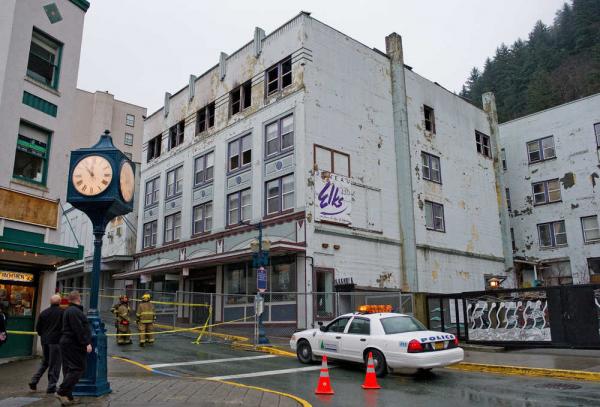Two Juneau designers want to build a hotel, to double as an apartment and high-rise condominium building, where the soon-to-be-demolished Gastineau Apartments building still stands in downtown Juneau.
Sitting at a plastic folding table in the middle of the City and Borough of Juneau Assembly Chambers Monday night, Jeremy Bauer and Jason Clifton of Bauer/Clifton Interiors told Assembly members their plan to purchase the land and develop the property.
“We want to shine a little light on something that has been a bone of contention for the citizens of Juneau,” Bauer said, referring to the fact that the Gastineau Apartments has been condemned for more than two years now and is considered an eyesore in the historic district.
The businessmen were accompanied via phone by their partner Lauri Kibby, a hotel developer out of Los Angeles. Together, the trio form Cascade Development, a team that “shares a unique vision that involves transforming the current location of the Gastineau apartment building into a mixed use facility that incorporates a boutique hotel, high-rise condominiums, apartment rentals, and parking,” according to a plan submitted to the Assembly.
The plan did not include a cost estimate for the project.
Bauer said Cascade Development has secured a binding letter of intent with the owners of the Gastineau Apartments, but the letter is contingent on one thing: Cascade Development must enter a public-private partnership with the city.
Bauer, Clifton and Kibby then tried to secure Assembly support for this partnership, which will be necessary for it to happen.
The Assembly members lauded the idea, but remained skeptical it would actually pan out.
When the city is finished demolishing the shuttered apartment buildings, slated to take place in January and completed by April, it will place a lien for the total cost of the demolition on the property to recover the construction cost. The lien doesn’t necessarily have to be paid in cash, though, said City Attorney Amy Mead. And that’s what the members of Cascade Development were there to negotiate with the Assembly.
Bauer, Clifton and Kibby asked the Assembly to allow them to cover the cost of the lien by offering a portion of their parking facilities to the city as public parking. They also offered to set aside some of the housing units in the building as affordable housing.
The lien will likely be at least $1 million, which caused some Assembly members, such as Mary Becker, to question whether parking spots would be enough to make up the cost of the lien.
“This is a much expedited process where there is a project on the horizon that is actively dealing with the encumbrances that may keep the land from being developed for quite a while,” Kibby told the Assembly. “I think that putting a multi-story hotel in downtown Juneau has benefits that we can’t even predict.”
Natural Gas in Juneau
The Assembly also gave its blessing — in the form of a promised letter of support from the city manager — to an effort by Avista Utilities to bring natural gas to Juneau.
Representatives from Avista and Alaska Electric Light and Power Company, itself a subsidiary of Avista, spoke to the Assembly about the prospect of transporting natural gas to the region primarily to unseat heating oil as the main heat fuel source.
“For us natural gas in Southeast Alaska will be nothing different than we normally do,” said Jeff Smith, a business analyst with Avista. “It will just be how we get it to the market that’s different.”
Smith touted a McDowell Group study from March that estimates the community will save between $5 million to $15 million annually with natural gas. The study, commissioned by Avista, also predicts that bringing natural gas to Juneau will create 60 to 180 new jobs “indirectly,” Smith said.
Assembly members largely favored the idea, but they questioned Smith and Eric Eriksen of AEL&P pretty thoroughly before voting unanimously to have the city manager draft a letter in support of Avista’s proposal.
Many of the questions had to do with the cost of conversion from heating fuel stoves to natural gas, which Smith said runs about $6,000 on average.
Large-scale conversion from heating oil to natural gas, however, is crucial to making this proposal economically viable, Smith said.
“The economics are definitely favorable for natural gas,” Smith said. “But the fewer conversions we have, and the economics start to go south fairly quickly.”

